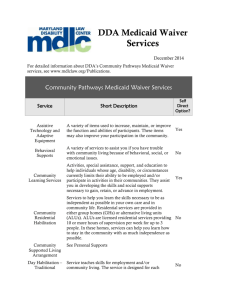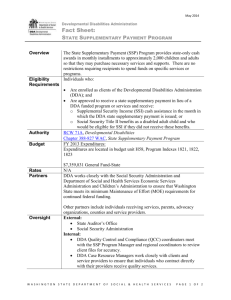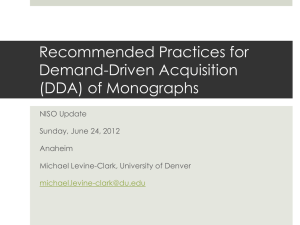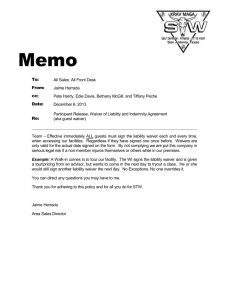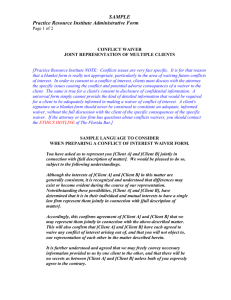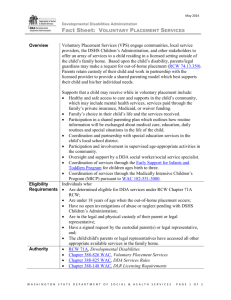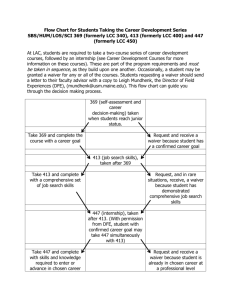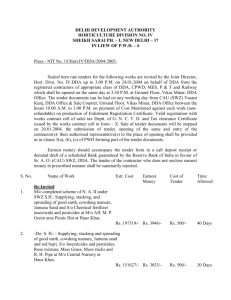how to request additional waiver services
advertisement
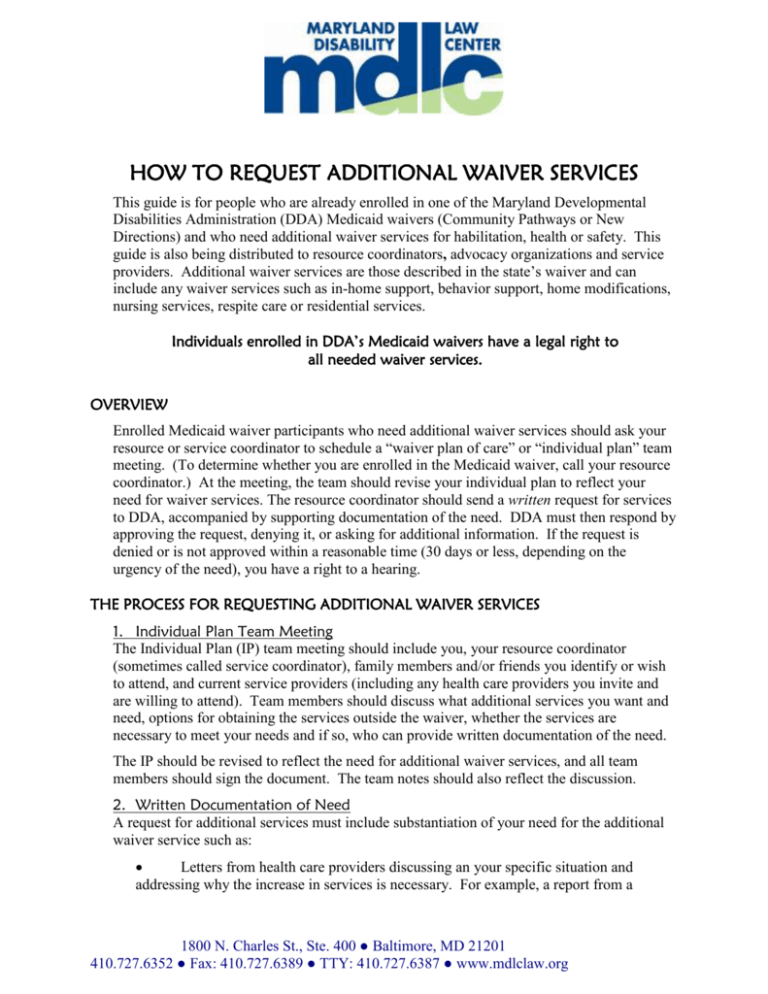
HOW TO REQUEST ADDITIONAL WAIVER SERVICES This guide is for people who are already enrolled in one of the Maryland Developmental Disabilities Administration (DDA) Medicaid waivers (Community Pathways or New Directions) and who need additional waiver services for habilitation, health or safety. This guide is also being distributed to resource coordinators, advocacy organizations and service providers. Additional waiver services are those described in the state’s waiver and can include any waiver services such as in-home support, behavior support, home modifications, nursing services, respite care or residential services. Individuals enrolled in DDA’s Medicaid waivers have a legal right to all needed waiver services. OVERVIEW Enrolled Medicaid waiver participants who need additional waiver services should ask your resource or service coordinator to schedule a “waiver plan of care” or “individual plan” team meeting. (To determine whether you are enrolled in the Medicaid waiver, call your resource coordinator.) At the meeting, the team should revise your individual plan to reflect your need for waiver services. The resource coordinator should send a written request for services to DDA, accompanied by supporting documentation of the need. DDA must then respond by approving the request, denying it, or asking for additional information. If the request is denied or is not approved within a reasonable time (30 days or less, depending on the urgency of the need), you have a right to a hearing. THE PROCESS FOR REQUESTING ADDITIONAL WAIVER SERVICES 1. Individual Plan Team Meeting The Individual Plan (IP) team meeting should include you, your resource coordinator (sometimes called service coordinator), family members and/or friends you identify or wish to attend, and current service providers (including any health care providers you invite and are willing to attend). Team members should discuss what additional services you want and need, options for obtaining the services outside the waiver, whether the services are necessary to meet your needs and if so, who can provide written documentation of the need. The IP should be revised to reflect the need for additional waiver services, and all team members should sign the document. The team notes should also reflect the discussion. 2. Written Documentation of Need A request for additional services must include substantiation of your need for the additional waiver service such as: Letters from health care providers discussing an your specific situation and addressing why the increase in services is necessary. For example, a report from a 1800 N. Charles St., Ste. 400 ● Baltimore, MD 21201 410.727.6352 ● Fax: 410.727.6389 ● TTY: 410.727.6387 ● www.mdlclaw.org HOW TO REQUEST ADDITIONAL WAIVER SERVICES Page 2 physical therapist could describe a need for support services because of an inability to walk safely without assistance; a report from a nurse or nutritionist could describe the need for special dietary or meal assistance, or a neuropsychological assessment diagnosing a complex disability could recommend specific services. These letters and reports should be as detailed, specific and recent as possible. Do not hesitate to ask health care providers to prepare a document for this purpose. Ask them to work with you and family members or others who support you so the health care provider understands the specific needs. The documentation should provide relevant history, diagnostic information, medications and current supports, discussion of risks, and specific recommendations for services you need. Letters from service providers and family members that describe your needs. Again, these letters should provide very specific information explaining why the requested services are necessary to support you in actively participating in the community or for health and safety. The letters should describe any risks without the services, and specify the type of service and hours requested. Behavior assessments and behavior plans. Behavioral data showing the frequency of dangerous behaviors. Families and service providers who support individuals with dangerous or inappropriate behaviors should keep records that show the time and frequency of the behaviors. Documentation of regression or loss of skills needed in order for you to live a life of a typical person at a similar age. This documentation should not focus on the needs of family members or other unpaid support unless there are reasons that the family member or unpaid support are unable to continue to provide services: e.g., they must begin to work outside the home, their health is at risk, they are physically unable due to age or illness to continue to provide the level of services they have been providing, or they can no longer provide services. 3. Service Funding Plan Request If you are requesting increased services from a particular service provider, a service funding plan can be included with the request, but DDA does not need to see a service funding plan to approve additional services. 4. Send Request to DDA Though anyone can request services on your behalf, including you, family members, friends and service providers, DDA prefers that resource coordinators make this request. The request for additional services should be in writing and addressed to the DDA regional office. The request should ask DDA to respond in writing within 30 days, but you can ask DDA to respond sooner if you have an urgent need. The request should be accompanied by: A copy of the IP and the team meeting notes indicating that the team met and agreed to the need for additional services; Materials to substantiate the need for the additional services; and The service funding plan, if one is available. Be sure to keep a copy of the entire request and supporting documentation. 1800 N. Charles St., Ste. 400 ● Baltimore, MD 21201 410.727.6352 ● Fax: 410.727.6389 ● TTY: 410.727.6387 ● www.mdlclaw.org HOW TO REQUEST ADDITIONAL WAIVER SERVICES Page 3 WHAT TO EXPECT FROM DDA Once you submit the documentation described above, DDA should provide a written response within 30 days (or sooner if you say you have an urgent need and request an earlier response). If DDA initially responds verbally, the resource coordinator (or others) should again write to DDA and request a written response. If DDA does not provide a written response, call MDLC. DDA may approve or deny your request, or ask for additional information. A denial should be in the form of a letter detailing the reason for the denial and including information about your right to appeal the denial. If DDA gives you a choice between an informal or other hearing, call MDLC for advice. If DDA refuses to provide a denial letter, but verbally denies the request, you may still appeal. You may also appeal if you don’t get a response from DDA within a reasonable time, which should be no later than 30 days (but you could request an earlier response to an urgent need). WHEN TO CONTACT MDLC MDLC is available to help you, family members, resource coordinators and service providers: If you need advice about working with a resource coordinator, provider or health care provider to request additional services; Decide how to proceed when the above steps have been taken and DDA has denied or failed to act upon a request for additional waiver services; Determine whether an appeal is appropriate, and if so, what type of hearing is best for you. When contacting MDLC, be prepared to provide the written documentation described above, a timeline of actions taken and interactions with DDA, and the names and contact information for yourself and others involved in making the request. Please contact MDLC INTAKE at 1 800 233 7201, Mon-Fri 10 a.m. to noon. MDLC is willing to provide technical assistance and advice to you and your supporters in all stages of requesting additional waiver services. In some cases, we will help you find pro bono (free) legal assistance. In select cases, MDLC will provide representation to you in an appeal. If you would like MDLC to consider representing you or assigning your case to a pro bono attorney, please contact us before you request an appeal. 1800 N. Charles St., Ste. 400 ● Baltimore, MD 21201 410.727.6352 ● Fax: 410.727.6389 ● TTY: 410.727.6387 ● www.mdlclaw.org
